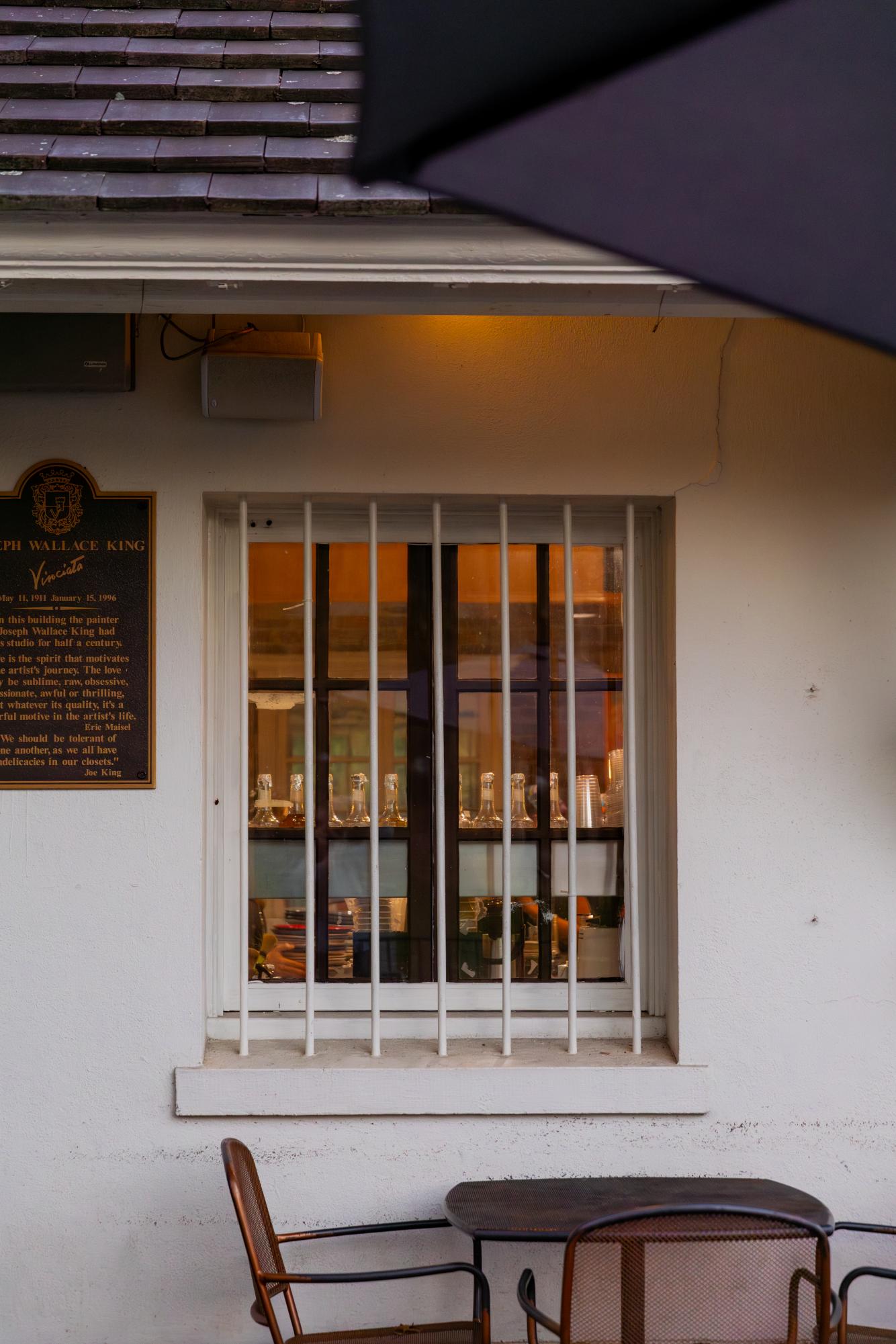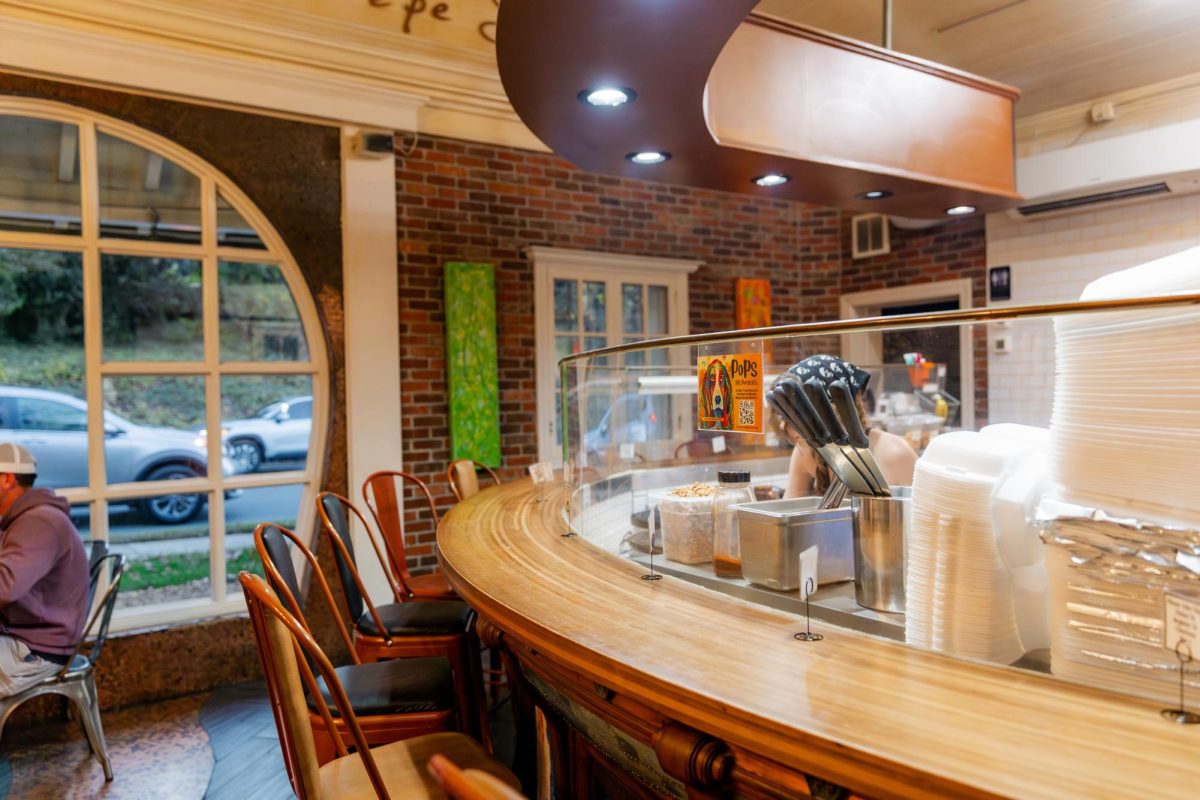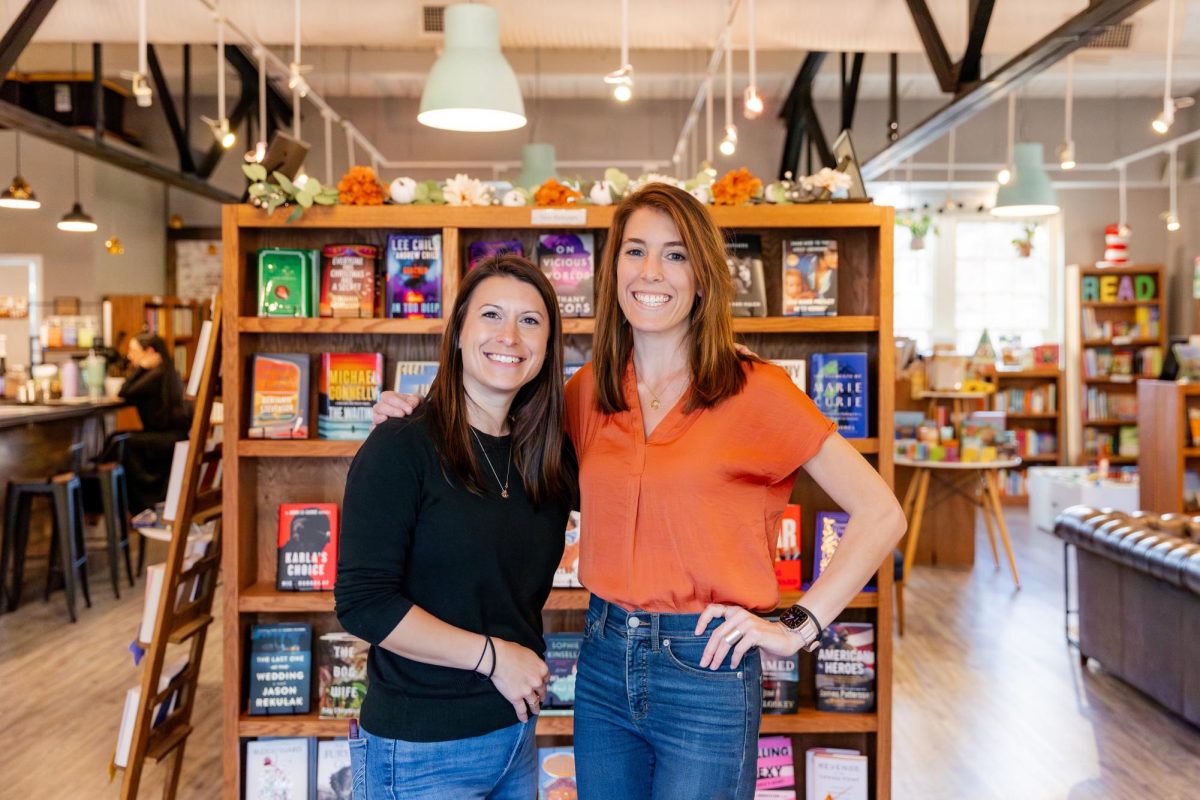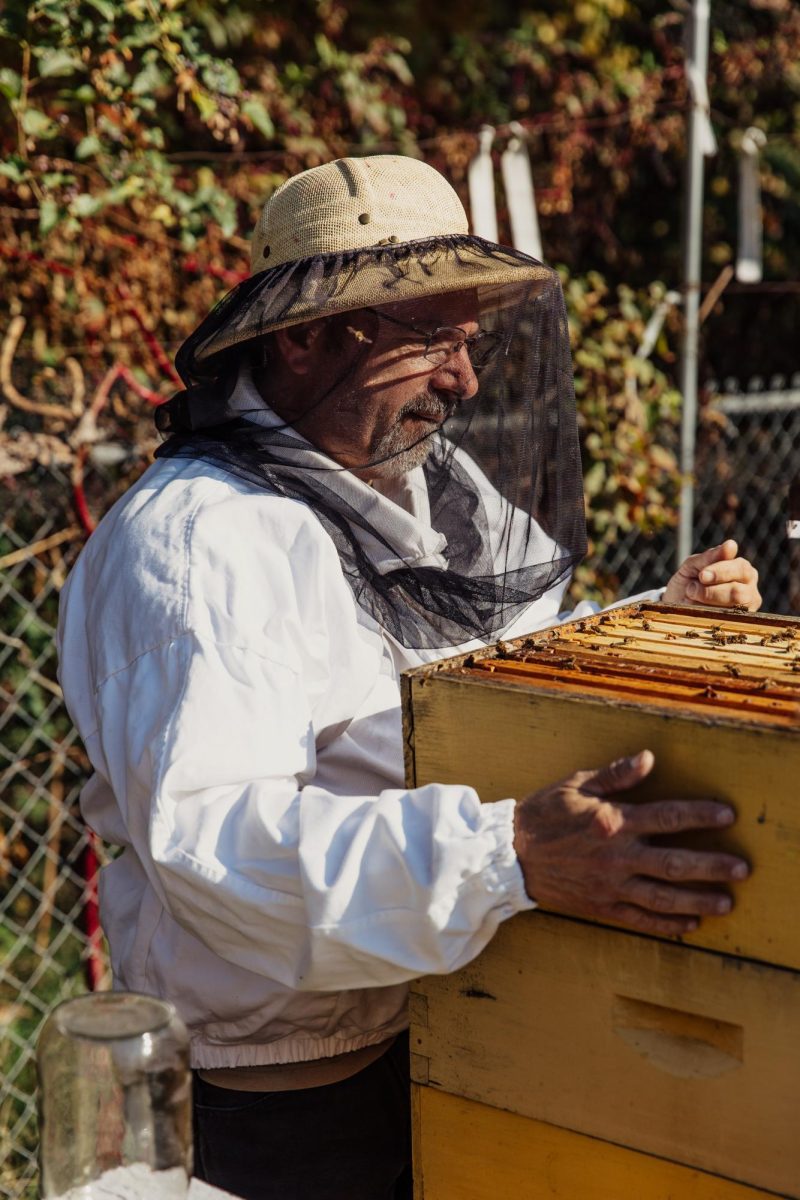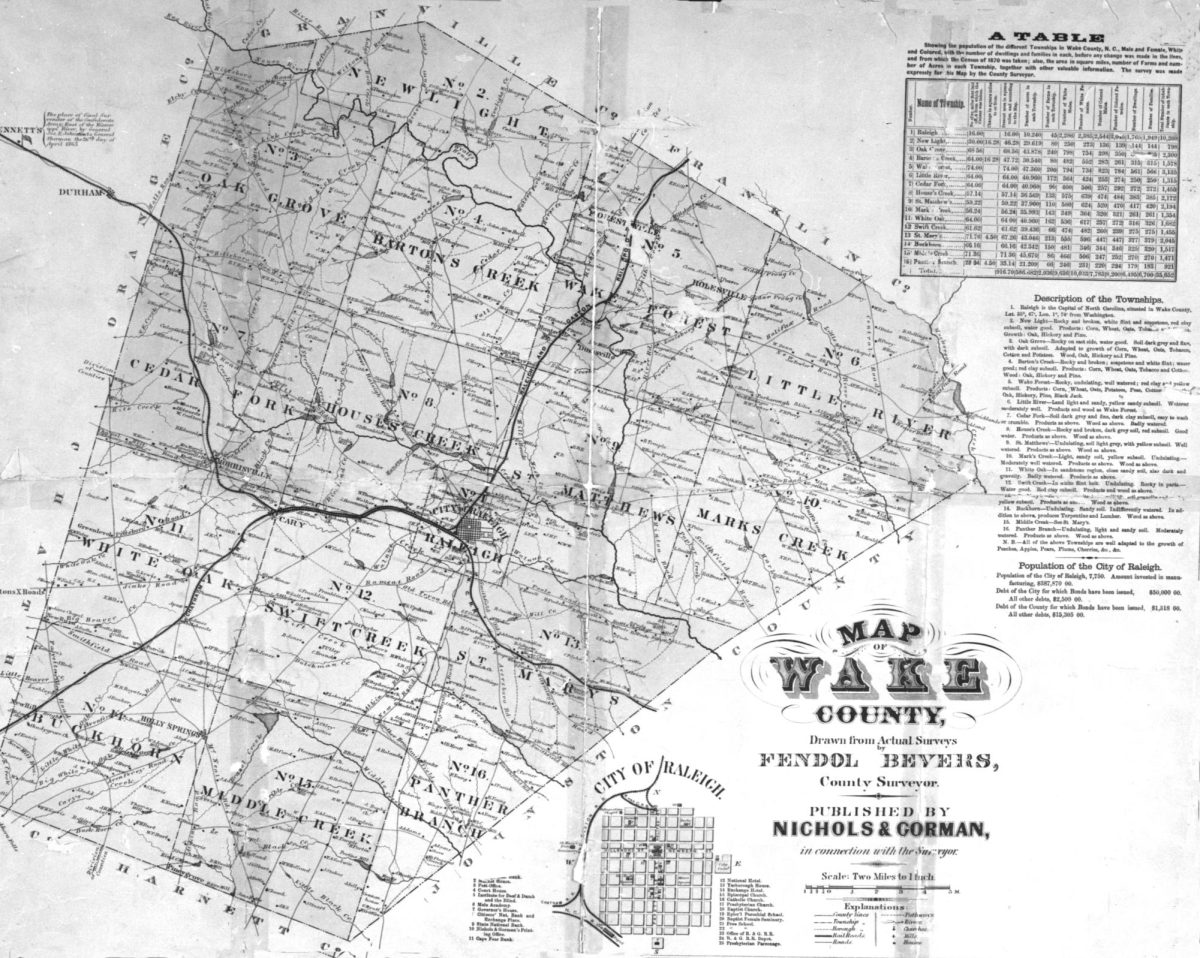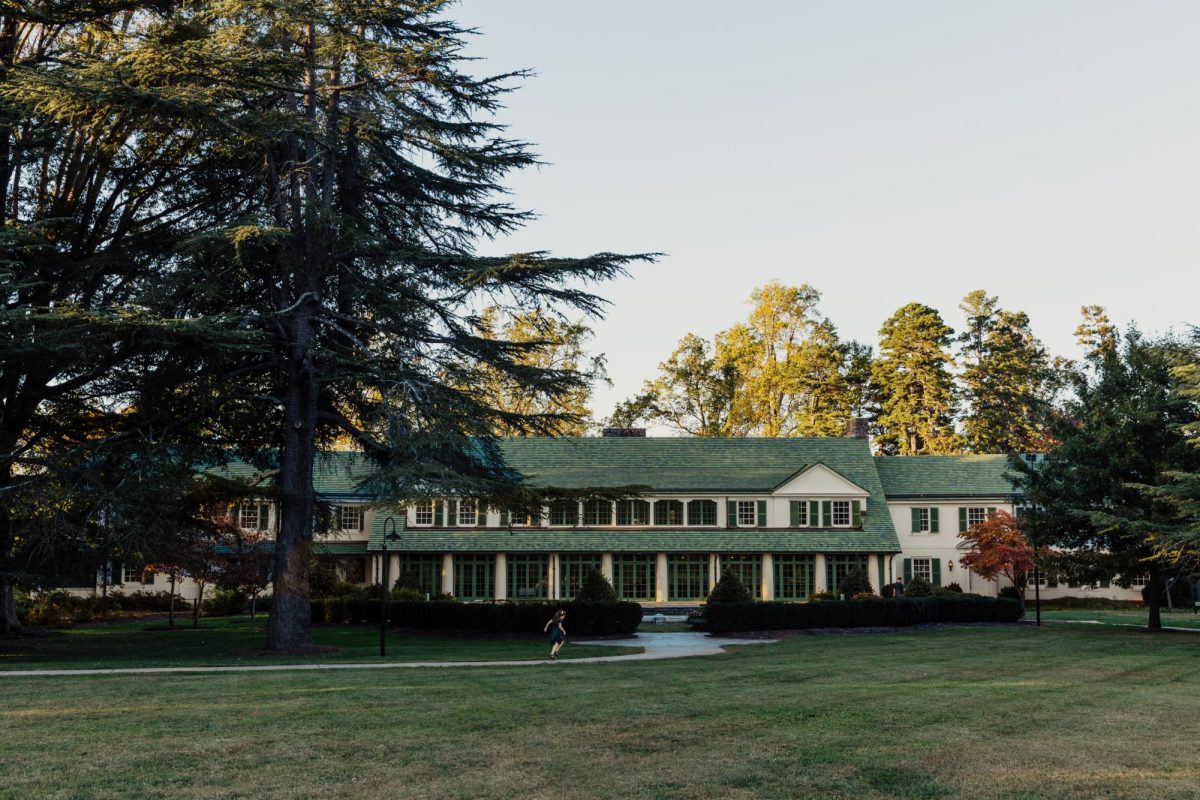A Day with Reynolda Business Owners
Annie Ewell relishes whipping up crepes. As she stands over the griddle, the pale yellow batter splays out and the edges start to curl, turning a golden-brown color. Spatula poised, she readies to flip, knowing the hungry diners on the other side of the arched glass might just as well be waiting to pounce on the finished product.
It is 11 a.m., and the lunch rush at Penny Path Café is starting to form — girls in Wake Forest University sweatshirts, old couples with golden retrievers and parents wrangling their energetic kids through the door. Once inside, the kids crouch to study a winding pattern of copper coins on the floor. The green and white cottage is where Ewell has spent the last four years serving up hot coffee and fluffy crepes.
“We cook the sweet and savory crepes at the same time, the smell of drying beans and fresh espresso mixed with the well-seasoned mushrooms,” Ewell said, her voice dreamy as she described the kitchen in the morning. “It is amazing.”
When Wake Forest University acquired Reynolda Village in 1965, the university welcomed small businesses into R.J. Reynolds’ old backyard. The corn crib, which held sun-drenched cobs, now houses a dumpling shop offering delicate dim sum. The old power plant, once rattling with machinery, is now filled with books and chatter about poetry.
Penny Path’s wooden name plate rests near the outdoor seating area: a steampunk rendering of Abraham Lincoln on a penny hints at treasures inside. On weekdays, five young employees work through a steady line, handing out crepes stacked with ice cream and sugar. The cafe’s crowd reflects owner Miro Buzov’s knack for business: He’s served diners in three North Carolina cities — High Point, Winston-Salem and Blowing Rock — winning them over with ease.
Buzov opened his small, 600-square-foot creperie on a quiet street in downtown Winston-Salem, laying a winding floor made of pennies by hand. After this initial location’s success, Buzov sought a second location in Winston-Salem, settling in Reynolda Village. The 17-seat nook grew to 60 seats, drawing students and visitors to enjoy stuffed crepes in this calm, tucked-away spot.
“We hoped people would beat a path made with pennies from our doorway to our register,” he said.
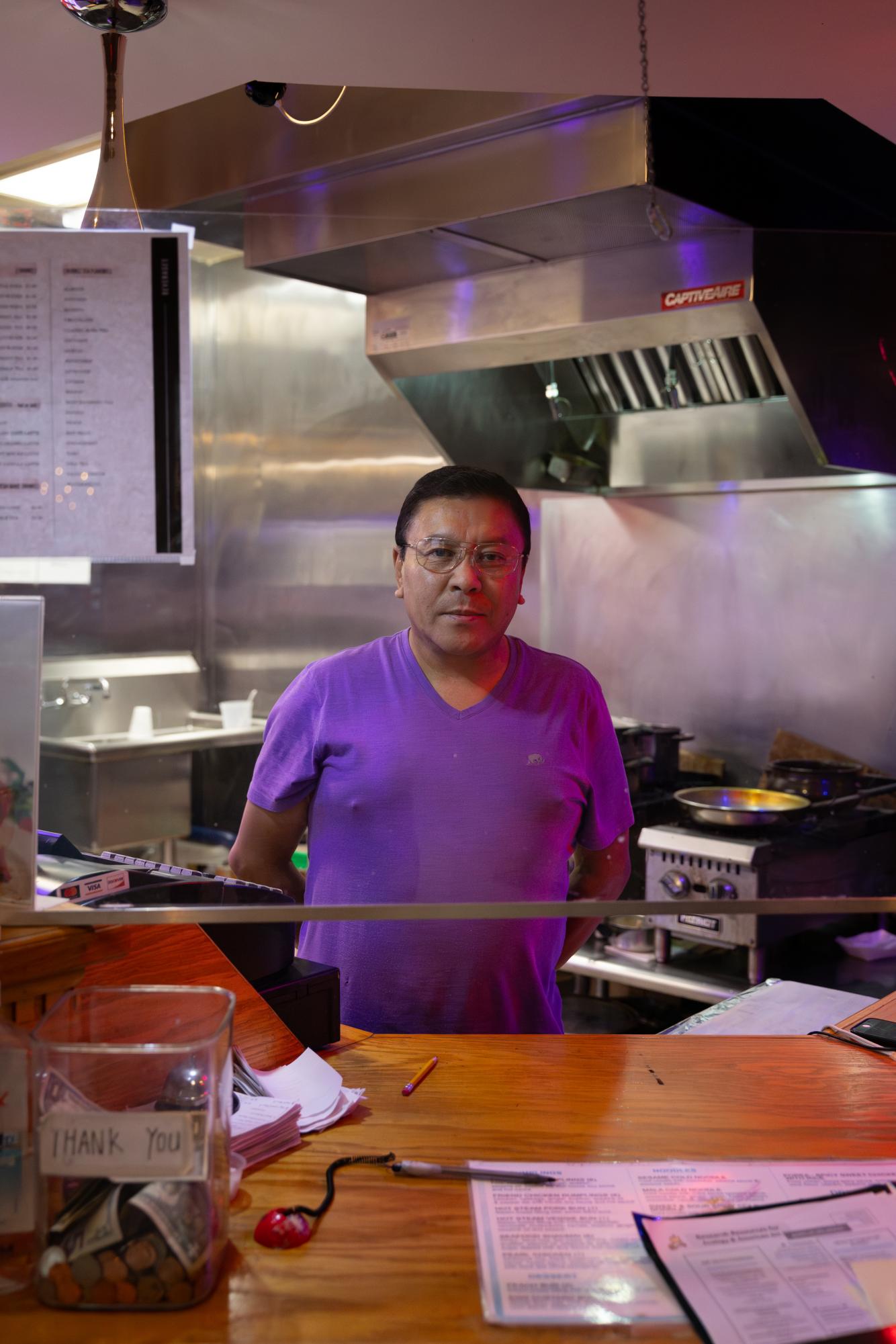
“Can I get three orders of pork dumplings?”
It’s a slow afternoon for Karma Tsering, who took only a half-dozen orders, nearly all dumplings. A green poster taped to the white cabin where he works says “May Way Dumpling” — a phonetic twist on the Chinese word for “delicious.”
Students cram into the narrow waiting area by the kitchen window, nudging each other. Which dumplings are you getting?
The menu plastered on the window reveals steamed veggie buns, cold noodles, soups and 20 flavors of boba tea. This was Tsering’s vision when he joined May Way in 2015: a handmade menu highlighting their secret sauce and a fusion between Indian and Chinese dishes. He crafted the cold noodles with mala sauce, cucumbers and carrots, along with a one-of-a-kind pork curry born from a customer request for a weekend special.
The sweet soy sauce is one of his proudest creations. It’s so popular they can sell seven liters in a day.
“You cannot find this… sauce anywhere in the United States,” Tsering insisted, gesturing to the rich, dark sauce that keeps customers coming back. “We created the secret recipe.”
All three workers at May Way are Tibetan immigrants. Tsering came to the U.S. in 1993 after teaching Hindi in India. Tsering knows the restaurant industry is no quick profit, but like many immigrants, it is a solid way to gain a foothold in a new country. He’s dabbled a bit in the restaurant industry, having opened eateries near Virginia Tech and another in Charlottesville.
“I suggest not starting very big,” Tsering said. “You cannot manage; you need to hire people. It’s too much. Every time you run the restaurant, you look at each other, and it’s just unhappiness.”
If Tsering hadn’t found happiness in his previous ventures, he has now, standing behind a modest counter beneath a kitchen hood that pulls in the scents of leek and ginger. Here, he sticks to his philosophy: everything must be fresh and high-quality. Buns take 15 minutes because they’re steamed on site — no microwaves, which he despises. Dumplings get their first steam in the morning, then are fried on the spot. And the boba? Pure tapioca starch, never the watered-down, wholesale version.
The COVID-19 pandemic sent ingredient prices through the roof, and Tsering’s already drooping eyebrow furrowed even further as the cost of soy sauce forced him to change the spice-to-sauce ratio in his prized recipe. Yet, May Way kept its affordable prices: six dumplings for $4.95, buns at $2.60 each, and filling soups for under $10.
“That’s what consumers want,” he explains. “This isn’t the kind of work where you’ll be a billionaire in a year, but it’ll stick around for a long time.”
At 4:00 p.m., Tsering settles into his corner desk. The kitchen hood buzzes above, foreshadowing the busy hours ahead. Soon, the phone will ring, and the space will fill with hungry people.
An hour later, Meghan Brown opens the door to the brand-new Bookhouse, just a year old. Her day at General Electric is over, and now the fun begins — working at the bookshop she has always dreamed of owning.
Brown strides past the front shelves, filled high with new releases from romantasy like “Fear the Flame” to gripping nonfiction such as “Targeted: Beirut.” Each is handpicked according to customer feedback, social media trends and her own taste. In the middle, six more rows offer an even spread of genres that fall within general fiction.
The bookstore is not only a dream of her own, but also shared by her sister, Tara Cool, who works here full-time during the day. Their reading tastes balance one another: Cool is the extrovert who digs sci-fi, while the more introverted Brown loves anything to do with history. Since their childhood, they have dreamed of owning a cozy bookshop and serving coffee.
“It was one of those dreams you don’t think is actually going to happen,” Brown said. “Then, a few months later, we are opening!”
The first year at the Bookhouse overflowed with events the sisters hoped would catch on: open mic nights, Monday morning children’s book readings and “blind dates with a book,” where they wrap books in brown paper and write clues about the plot for readers to select based on their curiosity.
Their main goal, however, is to make Bookhouse a true gathering place, a space where people can grab coffee, hear live music and discover the book that starts a lifelong love of reading.
“I love helping the kids find that book that opens that world for them,” Cool said.
Adults, too, come in searching for the perfect book, usually as a gift, and ask Cool for her top pick.
“I am just like, “Demon Copperhead!” It was so good, but it is a little heavy,” Cool said, describing the gritty story of addiction and poverty.
She usually pivots to “Theo of Golden,” a more heartwarming tale of a mysterious stranger in a southern city. For those seeking history or memoirs, she sends them to Brown, who, while not a people person, enjoys helping readers discover their next great read.
In an age when Amazon dominates the market, running a local bookstore is tough. Luckily, having a sister as a business partner means they always look out for each other.
Through refining their weekly events, the sisters found their efforts met with enthusiasm. Homegrown musicians like Mike Coia and Spencer Aubrey have become regulars at Wine Down Wednesday, while local authors like Tina Firesheets have hosted talks and signings at the store. Remote workers pop in for meetings over lattes, and guys gather at the bar to chat.
In April, the Bookhouse launched a Poetry Slam, drawing a tight-knit group of ten who craved the community connection they had missed during the pandemic. This year, Cool and Brown decided to expand the poetry slam into a three-part series starting in November.
“It doesn’t feel like work,” Brown said proudly. “It’s like raising a baby. You’re helping it grow.”
By 8:00 PM, the Bookhouse settles into quiet. Brown cleans the bar, shuts off the coffee machine, and locks the door.
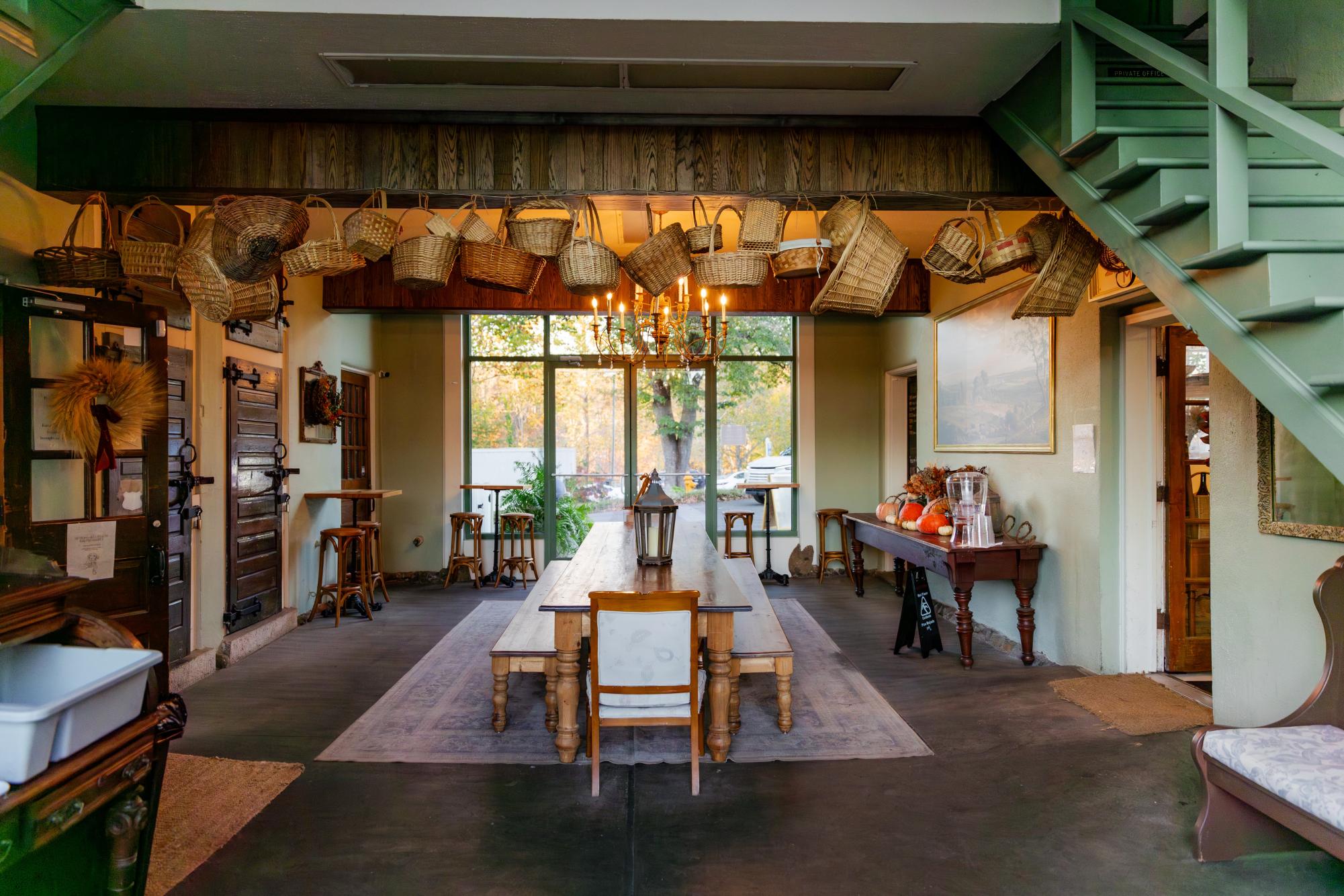
Across the street in a cleared grove, Theodore’s Bar & Market enters the night’s final round, flickering warmly under the chandelier. The lobby evokes a European estate, with an embroidered carpet rolled out beneath a long communal wooden table that straddles the breezeway of the Reynolda Village barn. To the left, the bar serves craft cocktails, beer and mocktails. To the right, shelves overflow with rolling pins, cutting boards and Red Tail Grains.
In the evenings, the bartender takes charge, and tonight, it’s Sam Miller. She slides behind the polished mahogany counter, fetches a coupe glass and pours a rich espresso martini. With a tilt, pumpkin latte ale spills over the surface of the drink.
At 27, the round-faced woman with piercing blue eyes has tended bars for almost half her life.
A Winston-Salem native, Miller started bartending at 17 in a downtown brunch spot, mastering basics like Bloody Mary, Peach Bellini and Mimosa. She loved it so much she moved to Austin to launch her bartending career at 18.
Miller soon discovered that the service industry is not very friendly, and even less so toward women. Though she serves and bartends, she prefers the latter; the bar provides a shield from patrons who might dish out harassment.
Tending a bar at an Austin airport, frustrated travelers would often ask her for directions. “I can’t tell you where the plane is, I’m just bartending,” she would say. There, she trained a whole staff who were clueless about proper cocktail crafting for over two years.
“I was one of those psycho bartenders who worked 70 hours a week,” she said. “I was in the right place at the right time.”
Yet Miller grew exhausted as the money poured in. At 20, she worked 30 hours straight at a crowded Austin café, eventually passing out. Her manager waited until she woke, passed her water, and said she needed to get back to work.
Tired of corporate culture, Miller started thinking about moving back to the Tar Heel State. She returned to Winston-Salem with her fiancé in June of 2024, interviewed at Theodore’s and was hired. She loves the aesthetic of the space; as a lifelong bartender, she cherishes the chance to work with crafted beer sans the suffocating rush of a high-volume Texas bar.
“It’s steady, it’s structural, it’s alive,” she said. “It’s that kind of environment where people can be chatting and relax.”
Customers love Miller. Sheryl and Bill Bowman, who’ve worked in restaurants since the 90s, sat with her at the bar during brunch. They chatted about how service jobs are viewed as unserious, yet workers hustle twice as hard as most.
“You are a wonderful anomaly,” the Bowmans told Miller.
At the moment, Miller is creating a winter drink series for Theodore’s: one that grasps the full essence of the season, not just a nod to Christmas. She is after that perfect first sip that brings the warmth and celebration of winter days. She’s weighing two ideas: a Ginger Old Fashioned with hints of ginger syrup, bourbon and ginger bitters, or a cozy mocha cider, layered with dark chocolate.
Miller hasn’t given up on the contract business. Someday, she might go back, but right now, she’s all in for the Wake Forest crowd: Students, parents and locals drop by her bar for a drink on gameday. She wants to make sure they have a great time.
Her schedule is still full, but it’s less hectic now that she works from noon until 9:00 PM. With little free time on her hands, she has yet to see other spots around the village. However, she’s heard about a place called Penny Path, a creperie nearby that supposedly serves up the best European-style sweets in town. She intends to visit soon and taste for herself.

